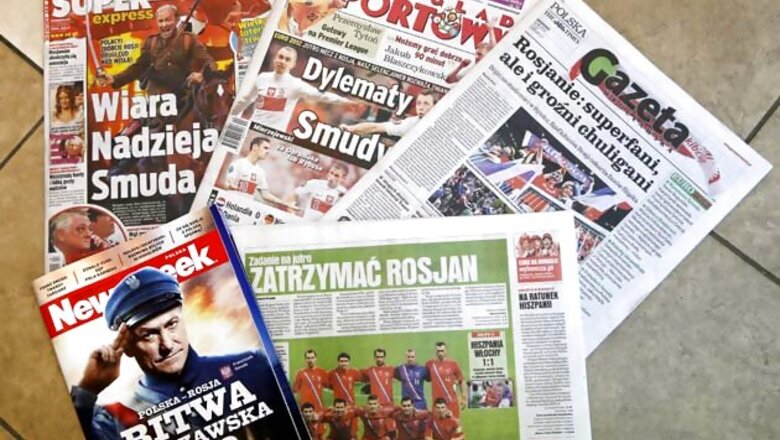
views
Warsaw (Poland): In Warsaw, you could be forgiven for thinking Poland's army is going into battle with Russia rather than its soccer team. Polish papers went to town on Monday on references to Poland's victorious 1920 battle against the Bolshevik Army, known as the Miracle on the Vistula, fueling simmering nationalist sentiments on the eve of the European Championship match at the National Stadium. Poles still take pride in the victory, which was seen at the time as halting the spread of communism into Europe.
Tuesday's highly charged match falls on Russia Day, a national holiday, and Russian fans plan to march from central Warsaw to the stadium, a move seen as provocative by many Poles. The march will be heavily policed after Russia supporters were shown in an online video beating stewards at their team's first match, against the Czech Republic in Wroclaw on Friday night.
About 10,000 Russian fans have bought tickets for Tuesday's game. Securing safe passage for the marchers will be the toughest task for police so far at the tournament, but Interior Minister Jacek Cichocki promised to maintain order.
For his part, the head of Russia's soccer federation, Sergei Fursenko, said the fans are merely walking to the stadium.
"There should not be any political themes there," Fursenko said on Russian state TV. "If someone tries to bring them in they will receive a strong rebuff from the police. I think the organizers of the march have learned this."
Poland and Russia have a long history of troubled relations, including four decades of Soviet Union dominance under communism that was overthrown in Poland in 1989.
The Super Express tabloid carried a front page mocked-up picture of Poland coach Franciszek Smuda charging on horseback, saber in hand, in a 1920 Polish army uniform under the headline "Faith, Hope, Smuda" — a play on an old army motto: "Faith, Hope, Motherland."
Super Express went on to warn the Russians against assuming they will win Tuesday.
"In 1920 they also thought that and ... they got a spanking," the tabloid said. "Tomorrow they will get the taste of defeat again, because Poland's team will show them Miracle on the Vistula 2," referring to the Warsaw river.
But many Polish fans believe that Russia has the stronger side and that the media were wrong to raise hopes in vain or build nationalist tension before the match.
"The newspapers should not be stirring up emotions, because it is clear we will lose. They are doing a bad job," 56-year-old chemistry researcher Marek Toczynski said.
Newsweek's Polish edition ran a front-page photo of Smuda saluting, in the uniform of Jozef Pilsudski — who was in command of Polish troops in the 1920 battle — under the headline: "Poland-Russia: The battle of Warsaw 2012."
The head of the Polish soccer association, Grzegorz Lato, tried to play down the political overtones.
"I cut myself off from the politics. We are apolitical, we are not interested in the atmosphere that some in the media are trying to create," he said. "It is simply a sports spectacle and that's what it should remain."
Lato did acknowledge, however, that because of the historical issues between the two nations, there is a heightened risk of trouble between fans. He said police and security forces met Monday to discuss possible scenarios and contingency plans.
"I'm convinced that the police and the security forces will be able to handle things for tomorrow's match," he told reporters at the National Stadium.
City security official Ewa Gawor discussed the march with Russian fans Saturday and said they will walk with whistles and drums to celebrate soccer, with no political context.
"We will be closely watching events during the march," she said.
June 12 marks the day in 1990 when Russian lawmakers declared independence from the Soviet Union by giving supremacy to Russian laws over Soviet legislation. Polish Prime Minister Donald Tusk has encouraged Poles to march together with the Russians to celebrate the day that "finally buried the Soviet Union."
A group of Russian fans made a gesture of friendship toward Poland on Monday by placing flowers at a monument to the ill-fated Warsaw Uprising against the Nazi German occupiers in the summer of 1944.
While city residents fought the Germans, the Red Army watched from across the Vistula river — a fact still remembered in Poland.
The Russian fans also laid flowers at a cemetery to Red Army troops killed while driving the Germans from the city in January 1945.
The Russian federation has pleaded with its large contingent of traveling supporters to show more respect at Euro 2012, and warned that UEFA could punish the team with a points deduction if they misbehave again.
Lato said isolated incidents were unavoidable, but he expects the majority of fans to behave.
"I think the Poland's fans will support their team in a cultured manner and the Russians will support their team as well, and together they'll create a wonderful spectacle in the stadium," he said.















Comments
0 comment